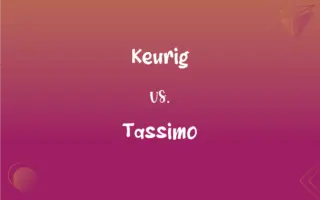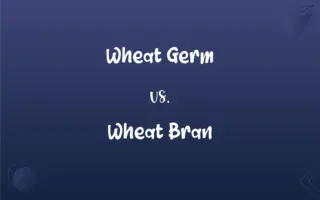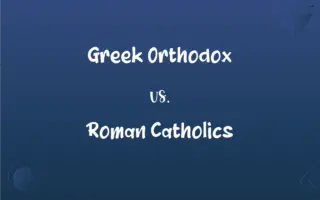UK vs. GB: What's the Difference?
Edited by Aimie Carlson || By Harlon Moss || Published on March 6, 2024
UK stands for the United Kingdom, including England, Scotland, Wales, and Northern Ireland. GB refers to Great Britain, comprising just England, Scotland, and Wales.

Key Differences
The United Kingdom (UK) and Great Britain (GB) are terms often used interchangeably but refer to different entities. The UK is a sovereign state that includes four countries: England, Scotland, Wales, and Northern Ireland. It represents a political and economic union that has its own centralized government and encompasses the entire archipelago, excluding the Isle of Man and the Channel Islands, which are Crown dependencies. Great Britain, on the other hand, strictly refers to the largest island within the British Isles, home to three of the four countries that make up the UK: England, Scotland, and Wales. GB does not include Northern Ireland or any of the UK's smaller islands.
The distinction between the UK and GB is significant in terms of governance and identity. While the UK has a single government based in London, each country within it, including Scotland, Wales, and Northern Ireland, has varying degrees of autonomy and its own devolved parliament or assembly. Great Britain does not have a separate government; its affairs are managed as part of the UK's unified political system.
In terms of international representation, the UK is the recognized sovereign state that represents the entire union in international affairs, including diplomacy, defense, and sports in some contexts. For example, in the Olympics, athletes compete under "Team GB," which, despite its name, includes athletes from Northern Ireland, reflecting the use of "GB" as a shorthand for the whole UK in certain contexts, albeit inaccurately.
The distinction affects citizenship and legal identity. Citizens are officially citizens of the United Kingdom of Great Britain and Northern Ireland, not just Great Britain. This comprehensive designation reflects the inclusive nature of the UK's legal and political framework, which encompasses the diverse cultures and identities of its constituent countries.
Comparison Chart
Countries Included
England, Scotland, Wales, Northern Ireland
England, Scotland, Wales
ADVERTISEMENT
Geographical Scope
Includes the island of Great Britain, Northern Ireland, and many smaller islands
The island of Great Britain only
Political Entity
Sovereign state with centralized government
Geographical term, not a political entity
International Representation
Represents the entire union in international affairs
Does not represent a political entity; used informally to refer to parts of the UK
Legal and Citizenship Terms
Citizens are of the United Kingdom of Great Britain and Northern Ireland
No citizenship of GB; it's part of the UK
UK and GB Definitions
UK
Participant in international organizations.
The UK is a member of the United Nations.
ADVERTISEMENT
GB
A geographical term, not a political one.
Maps of GB show England, Scotland, and Wales.
UK
A sovereign state comprising four countries.
The UK Parliament is located in London.
GB
The largest island in the British Isles.
Great Britain is surrounded by over 1,000 smaller islands.
UK
Competes in the Olympics as Team GB.
Athletes from the UK compete under Team GB, including those from Northern Ireland.
GB
Part of the UK's official name.
The UK's full name includes Great Britain to denote its main landmass.
UK
Has a unified legal system with regional variations.
In the UK, Scotland has its own legal system.
GB
Used in some sports contexts.
Team GB includes athletes from across the United Kingdom.
UK
Issues passports to its citizens.
UK passports are issued by the British government.
GB
Does not include Northern Ireland.
When traveling from GB to Belfast, you're leaving Great Britain.
UK
A monarchy in northwestern Europe occupying most of the British Isles; divided into England and Scotland and Wales and Northern Ireland
GB
A highly toxic chemical nerve agent that inhibits the activity of cholinesterase
GB
A unit of magnetomotive force equal to 0.7958 ampere-turns
GB
A unit of information equal to one billion (1,073,741,824) bytes or 1024 megabytes
GB
A monarchy in northwestern Europe occupying most of the British Isles; divided into England and Scotland and Wales and Northern Ireland
FAQs
What is included in GB?
The island comprising England, Scotland, and Wales.
Is Northern Ireland part of GB?
No, it's part of the UK but not GB.
What does GB stand for?
Great Britain.
Which countries are in the UK?
England, Scotland, Wales, and Northern Ireland.
What does UK stand for?
United Kingdom of Great Britain and Northern Ireland.
What passport do people from GB have?
A UK passport.
Can "UK" and "GB" be used interchangeably?
No, they refer to different entities.
Who governs the UK?
The UK government, based in London.
Who governs GB?
GB does not have a separate government; it is governed as part of the UK.
Do GB and the UK have the same head of state?
Yes, the monarch of the UK is the head of state for both.
What flag represents the UK?
The Union Jack.
How does Brexit affect the UK and GB?
It affects the UK as a whole, including all parts of GB and Northern Ireland.
Is healthcare the same in the UK and GB?
The UK has a unified National Health Service, but there are regional differences.
Are there different laws in GB and Northern Ireland?
Yes, there are some legal differences between Northern Ireland and the rest of the UK.
Is the Isle of Man part of the UK or GB?
Neither; it's a Crown dependency with a unique relationship to the UK.
What flag represents GB?
There is no specific flag for GB; the Union Jack is also used.
Can I travel between GB and Northern Ireland without a passport?
Yes, if you're a UK citizen, but ID may be required.
How do education systems differ within the UK and GB?
Education systems vary among England, Scotland, Wales, and Northern Ireland.
What currency is used in the UK and GB?
The British Pound Sterling.
Are sports teams the same for the UK and GB?
Not always; for example, the Olympics team competes as "Team GB" but includes athletes from all over the UK.
About Author
Written by
Harlon MossHarlon is a seasoned quality moderator and accomplished content writer for Difference Wiki. An alumnus of the prestigious University of California, he earned his degree in Computer Science. Leveraging his academic background, Harlon brings a meticulous and informed perspective to his work, ensuring content accuracy and excellence.
Edited by
Aimie CarlsonAimie Carlson, holding a master's degree in English literature, is a fervent English language enthusiast. She lends her writing talents to Difference Wiki, a prominent website that specializes in comparisons, offering readers insightful analyses that both captivate and inform.







































































